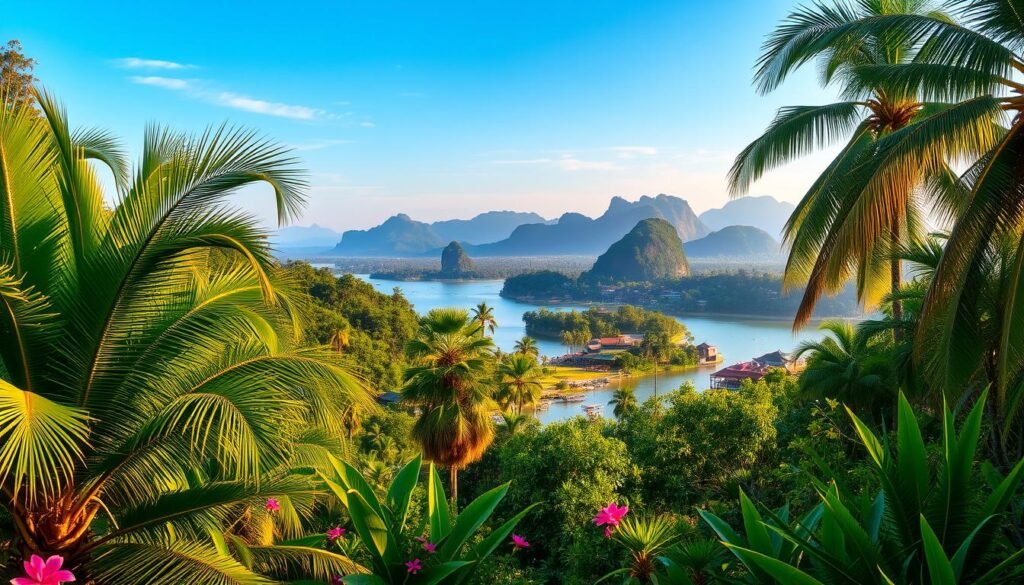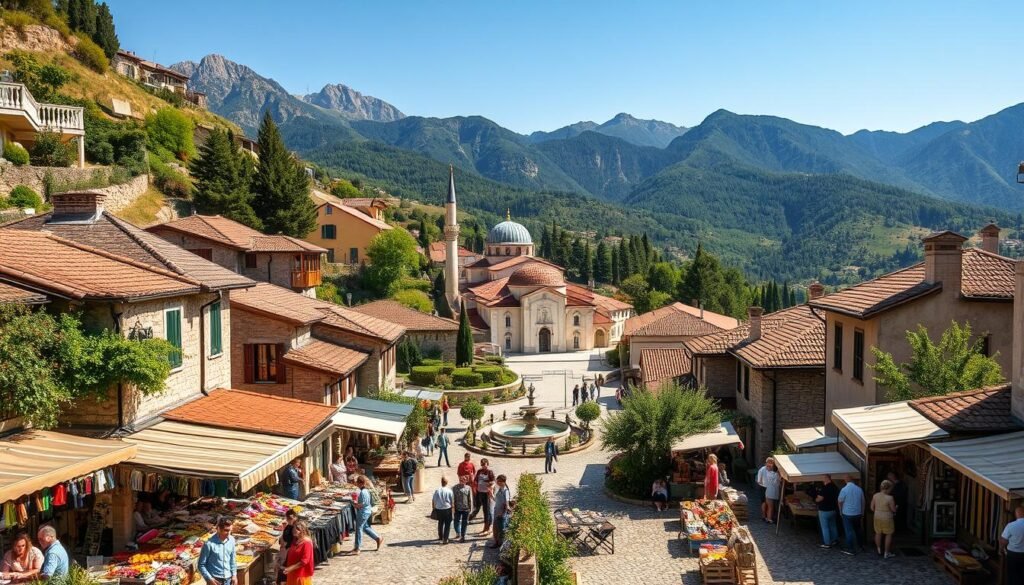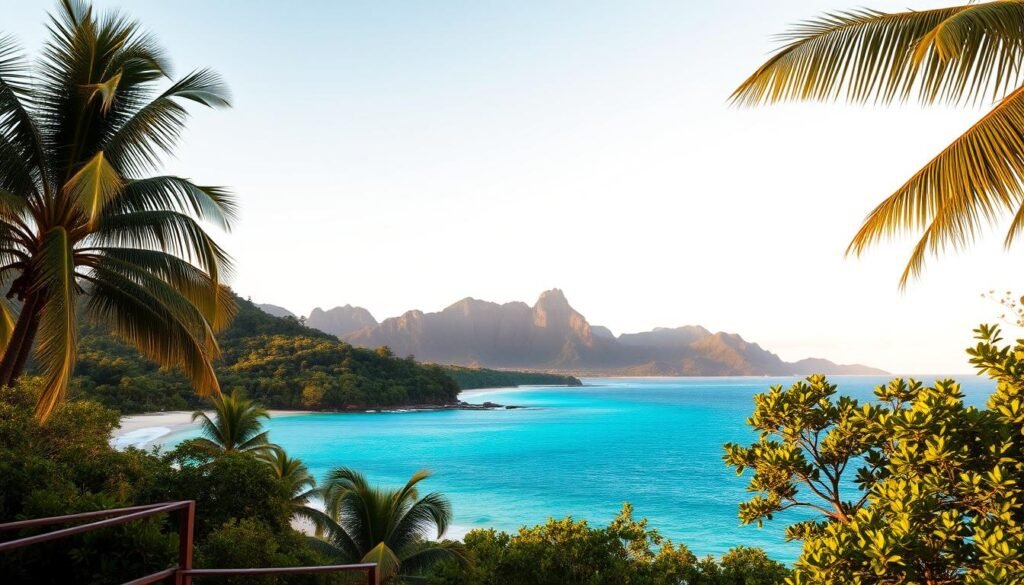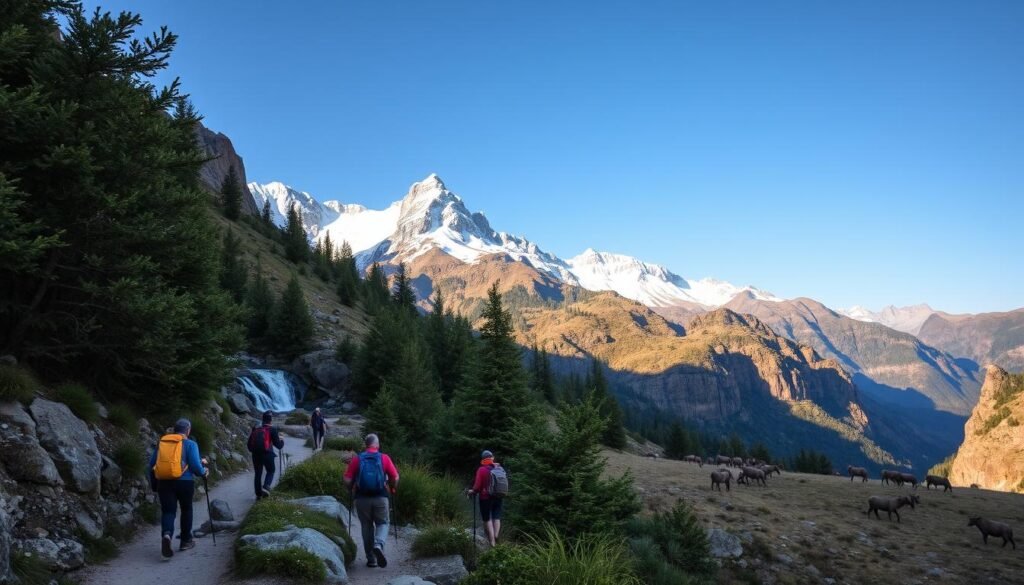Explore Affordable Holiday Destinations Worldwide
Can you find a trip that feels rich and costs less than a night out back home?
We think you can. Right now, the world holds spots where daily costs often sit between $35 and $50 per person. That makes planning a meaningful journey on a tight budget realistic and fun.
We checked on-the-ground prices to show real examples: Vietnam meals for a few dollars, local beer around $0.25, and clean double rooms from roughly $14 per night. In Chiang Mai, dorms start near $6, while Albania has hostels around $10 and lunches for $2–$4.
Our guide highlights a mix of beaches, islands, cities, mountain treks, and cultural hubs so you can tailor a value-first trip. We explain how these choices stretch your money and boost the travel experience with local food, friendly guesthouses, and memorable activities like caving or alpine hikes.
Ready to compare prices and pick the best season? Read on and we’ll help you plan confidently.
Key Takeaways
- Many spots worldwide let travelers live well for about $35–$50 per day.
- We used current, on-the-ground prices to present real value and prices.
- Examples include Vietnam, Thailand (Chiang Mai), Mexico, and Albania.
- Low daily costs still deliver rich food, culture, and activities.
- Use these comparisons to plan a budget-smart trip and choose the best season.
Why travel now: how we define “affordable” and what your money buys today
Right now is a smart moment to stretch your travel dollar without giving up great experiences. We define affordable as the ability to travel comfortably for about $25–$50 per day per person. That covers lodging, food, local transport, and one paid activity.
Typical day budgets vary by country. Backpacker figures include Vietnam ~$25/day, Nepal ~$20/day, Laos and Cambodia ~$25/day, and Mexico around $40/day. Mid-range examples show Mexico at ~$65/day and Vietnam near ~$45/day.
Typical daily budgets: $25-$50 per person, per day
Here’s what a usual day buys: a guesthouse or dorm, street meals, short buses or ferries, and a paid experience like a museum or guided hike. In Chiang Mai dorms can be as low as $6 per night; outside Bali guesthouses with AC run near $12.
Smart timing: peak season vs shoulder months to save without sacrificing experience
Shifting time by weeks can cut prices and crowds. Vietnam’s peak is Nov–Mar; Thailand peaks Nov–Feb. Peak season brings settled weather and festivals, while shoulder months often mean lower prices and fewer tourists.
- Tip: Inland or secondary towns usually lower your usd per day than resort hubs.
- Tip: A little rain in shoulder months often still delivers a great experience at better prices.
Affordable holiday destinations
Our shortlist breaks the world into quick regions for easy trip planning. It’s a fast way to see where your money goes further and which spots match your travel style.
Quick shortlist by region:
- Asia (Southeast Asia): Vietnam, Nepal, Thailand, Cambodia, Laos, Indonesia, the Philippines, India — southeast asia offers unmatched street food and low nightly rates.
- The Balkans & Europe: Albania, Bosnia & Herzegovina, Bulgaria, Romania, Georgia — authentic culture and easy budgets for curious tourists.
- The Americas: Mexico, Colombia, Guatemala, Argentina, Cuba, Bolivia, Nicaragua, El Salvador — diverse scenes and strong value per day.
- Africa: Morocco, Cape Verde — culture, islands, and prices that undercut big resort spots.
- Oceania: Fiji’s Vanua Levu — a sleeper pick where local guesthouses and bure stays deliver real value.
We map the world so you’ll find quick ideas for places visit and fast comparisons. In each region we point out one cheapest contenders depending on season and route, helping you narrow choices in this short guide.
Southeast Asia standouts: Thailand, Vietnam, Cambodia, Laos, and Indonesia
From mountain treks to island escapes, these Southeast Asia picks give the most value per day. We outline quick facts to help plan routes through each country while keeping a tight daily budget.

Thailand on a budget
Chiang Mai dorms start from about $6 per night while nicer hotels with pools run near $35 usd per night. Inland backpackers often manage around $30/day, with lively street markets and cheap local transport.
Vietnam value
Expect meals for a few dollars and locally brewed beer near $0.25 per glass. Clean rooms go from roughly $14 per night, so per meal costs and strong street food culture keep daily totals low.
Laos and Cambodia highlights
Laos serves low-key adventure—treks, Mekong journeys, and the Gibbon Experience—at backpacker prices near $25/day. Cambodia goes beyond Angkor to islands and Battambang, with cheap eats and easy exploration.
Indonesia’s islands beyond Bali
Lombok, Sulawesi, and Flores offer island guesthouses near $12 and meals around $2–$2.50. Peak season runs June–September, but shoulder months can stretch your budget and keep crowds thin.
Island and beach bliss without breaking the bank
Sun, sand, and smart planning let us enjoy true paradise while keeping costs low. We list beach greats where island-hopping, reef snorkels, and budget beach huts make every day feel special.
Philippines’ Palawan: island-hopping and wreck snorkels
Palawan centers on El Nido day trips, cheap scuba options, and WWII wreck snorkels. Budget huts and homestays are common, with peak season Mar–May and wet Jun–Oct.
Lombok and the Gili Islands: surf, treks, and warungs
The Gilis are motor-free, great for relaxed days and warung dining. Lombok adds Rinjani treks. Prices often drop in the wet season (Oct–Apr), lowering per night rates.
Zanzibar: Kendwa, Pongwe, and Jambiani
Kendwa offers swimmable sands. Pongwe and Jambiani bring calm reefs and simple seaside stays. We find good value stays and easy transfers from Stone Town.
Southern Mozambique: soft sands and snorkeling safaris
Tofo to Barra has ribbon-like beaches, cheap boat rentals, and snorkeling safaris. ATM access can be limited; we recommend carrying cash for transfers and day trips.
- Plan island-hopping legs early to save on boat fees and time.
- Compare per night homestays and guesthouses for best usd per activity value.
- A bit of shoulder-season rain often still leaves many sunny beach days.
Best value in the Americas: Mexico, Colombia, Nicaragua, and El Salvador
In the Americas, a few countries deliver beach days, city culture, and low daily costs that stretch your trip further.
Mexico for beaches and cities
Mexico remains a top country pick for its rare mix of Yucatán sands and Mexico City culture. Backpacker figures land near $40/day, while mid-range travelers often see about $65/day.
Cheap flights to Cancún make beach legs easy. Peak season runs Jun–Sep and January; shoulder windows are Oct–Nov and Apr–May. That timing can cut nightly costs and keep crowds smaller.
Colombia on the cheap
Colombia rewards longer trips with Cartagena’s Caribbean charm, Medellín’s upbeat city life, and coffee country landscapes. Backpacker budgets are around $30/day.
Typical meals can be about $2.50, and a menu del día may drop to $1.50 in some towns. We still advise basic safety steps while exploring coast and highland places.
Nicaragua as a budget alternative
Nicaragua is one of the region’s one cheapest plays. Backpacker usd per day averages near $30.
Top places include Ometepe, Granada, León, and San Juan del Sur. You’ll find surf towns and colonial charm for a fraction of nearby Costa Rica prices.
El Salvador’s comeback
El Salvador now offers volcano hikes and Pacific swells with wallet-friendly stays and food. Backpacker daily figures are about $30 and peak season runs Nov–Mar.
- Season tip: Match Mexico’s shoulder months or Nicaragua’s Nov–May dry window to save.
- Route idea: Link a Yucatán beach leg with a Mexico City stop, then fly south to Colombia for coast and coffee.
- Local people: Plan slow travel days to meet locals and stretch your budget further.
European bargains we love: Albania, Bulgaria, Romania, and Bosnia & Herzegovina
You can stretch a small travel fund far across the Balkans without skipping big experiences.
Albania is one of our top country picks for budget wins. Hostel dorms run around $10, budget rooms near $25, and lunches cost about $2–$4. Backpacker daily figures sit near $25/day. Shoulder months Apr–Jun and Sep–Oct keep weather mild and prices low.

Bulgaria’s undertouristed treasures
We love Bulgaria for monasteries, Belogradchik cliffs, and Plovdiv’s old town. Backpacker totals often land near $40/day. Spring through fall is the best time to visit.
Transylvania and Romania
Transylvania offers castles, romantic towns, and Carpathian hiking. B&Bs and small guesthouses start near $30–$40 per night. This place is ideal for castle hunts and nature day trips.
Bosnia & Herzegovina: Sarajevo and Mostar
Bosnia blends deep culture with great value. Backpacker figures average about $30/day. The capital and Mostar are must-see places to visit for history, markets, and riverside cafes.
- Mix accommodation: hostel, B&B, or guesthouse to match comfort and budget.
- Travel tip: use trains and regional buses to stitch these countries into one cost-efficient route.
- Season tip: travel shoulder months to lower prices and avoid crowds.
South Asia for epic value: Nepal and India (Goa)
South Asia pairs Himalayan treks with beach time for serious value and big experiences. Nepal’s tea-house routes and Goa’s shoreline let us stretch a tight travel plan into something memorable.
Nepal’s Himalaya on a budget: tea-house treks and base camp dreams
We showcase the mountain range as a budget icon. Tea-house treks toward Annapurna Base Camp let backpackers hike and sleep for about $20/day.
Meals and a bunk per night are often bundled at tea houses, so daily totals stay low. The peak season runs Oct–Nov, with shoulders in Sep, Dec, and Mar–Apr when trails are quieter.
Goa, India: seafood thalis, serene beaches, and guesthouses that save you money
Goa is a small country-level contrast in vibe: Portuguese-influenced towns, seafood thali culture, and simple guesthouses. Many beach stays close May–Sep for monsoon, so we prefer Mar–Apr or Oct–Nov to snag deals.
Food favorites keep costs down: dal bhat in Nepal and vindaloo or fish curry thalis in Goa. Both spots reward slow travel and local choices for extra budget value.
- Pack light layers for high trails and a dry-bag for coastal days.
- Use local buses and shared jeeps to reach trailheads or beach villages.
- Bring a small first-aid kit so you feel at home on remote legs.
Fiji for less: Vanua Levu’s reefs, waterfalls, and budget-friendly bure stays
Vanua Levu feels like a quieter slice of Fiji where reefs, rivers, and village life set the pace.
We zoom in on this island for coral-rich sites like Rainbow Reef and the Namena Marine Reserve. These spots deliver strong snorkeling and diving at a better usd per dive than pricier resorts nearby.
Our tips point to traditional bure stays, local guesthouses, and small resorts as practical accommodation choices. Eating local—kokoda or a banana-leaf lovo feast—keeps meals tasty and low cost.
Traveling in the wet season (Nov–Apr) often brings the lowest rates without losing reef or waterfall days. Ferries and short flights link Vanua Levu with other islands; pick a base that balances reef access with lively market towns.
- Where to base: choose a village near diving operators and markets.
- Money tip: book mixed dives and local boats to lower your per-trip cost.
- Why go: quiet beaches, coral walls, and a slice of paradise in the world’s island network.
Australia’s tropical value base: Far North Queensland and the Great Barrier Reef
Cairns works as a smart tropical base when we want reef days and rainforest walks without splurging.

Cairns on a budget: lively hostels, happy hours, and reef access
We position Cairns as a budget-smart city hub to the Great Barrier Reef and nearby rainforest day trips. Hostels line the Esplanade and offer social dinners and cheap tours.
Market eats and happy hour deals make daily spending predictable. Rusty’s and night markets are great for fresh seafood and local snacks.
Reef trips to Green Island fit neatly into a single-day trip, and operators range from basic to full-service. Kuranda is a quick train or skyrail ride into rainforest villages and falls.
- Timing: travel Apr–May or Sep–Oct to avoid peak season and still enjoy good weather.
- Nearby spots: Trinity and Clifton beaches for low-key sand days.
- Tip: compare inclusions—snorkel gear, park fees, and transfers—before you book to keep the budget steady.
“Use Cairns as a base and you can explore reef walls and rainforest trails without paying island resort prices.”
Cape Verde’s island mix: Santo Antão hikes and Sal’s affordable beach time
Cape Verde mixes sea-swept beaches with steep island trails that surprise most first-time visitors. This country feels safe and easy to explore, and we find backpacker figures near $45/day.
Santo Antão is our go-to place for dramatic hikes and green valleys. Sal is the easy beach option where simple resorts and B&Bs keep costs low.
Accommodation ranges from friendly guesthouses to modest resorts, so we can match comfort and budget. Ferries and short inter-island flights run often; planning a few legs ahead saves time and cash.
Peak months are Dec–Jan and Jun–Sep. Shoulder windows (Feb–Apr, Sep–Nov) offer lower prices and good weather for both trails and sands.
- Local people: warm hosts and safe towns make Cape Verde a confident first-timer’s place.
- Why go: one cheapest-feeling archipelago for Europeans and Americans seeking winter sun.
“Combine Santo Antão’s ridges with a few Sal beach days and you get the best of both worlds.”
Turkey and Georgia: culture-rich routes with strong value
A route from Istanbul to Tbilisi pairs iconic history with great value for travelers. We build a two-country arc that blends Türkiye’s famed sights with Georgia’s one best-value picks in the Europe–Asia crossover.
Türkiye highlights on a budget: Istanbul is handy for stopovers—Turkish Airlines often includes hotel perks on long layovers. Prices rose in 2024 but many places remain reasonable. Cappadocia still delivers timeless scenery, and coastal stretches add beach days if you have the time. Peak season runs May–Sep; shoulder months Apr and Oct give better rates and fewer crowds.
Georgia for foodies and hikers
Georgia rewards slow travel. You can manage near $15/day in low-cost towns, with meals about $2 and hostels from around $6. Marshrutkas and regional buses keep transport cheap.
Kazbegi offers mountain range moments for hikers and photographers who want alpine views on a budget. Tbilisi’s cafes and wine scene add big-city charm without big-city prices. We’ll find easy ways to split time between the capital and highlands.
- Route tip: fly low-cost between Istanbul and Tbilisi or use overnight buses to save daylight hours.
- Season tip: pick Apr/Oct in Türkiye and summer–autumn in Georgia for comfort and lower prices.
- Logistics: marshrutkas, regional buses, and budget flights streamline border legs and keep the budget steady.
“Combine an Istanbul stopover with a few days in Kazbegi and Tbilisi for culture, mountains, and great value.”
Backpacker favorites in Southeast Asia: what keeps prices low
Small choices add up. Local markets, street stalls, and shared rooms make a big difference to our daily spending. We focus on simple habits that keep travel cheap without dulling the experience.
Street food economies: per meal for a couple of dollars
Street food often costs just a few dollars in Vietnam and nearby countries. In many places a bowl or plate is two dollars or less, and local beers can run near $0.25 a glass.
Eating where locals eat saves money and delivers authentic flavors. Markets and warungs replace pricier restaurants and stretch your budget further.
Hostels and homestays: per night savings and social perks
Shared dorms and family-run homestays cut lodging costs sharply. Chiang Mai dorms start around $6 per night, and outside Bali guesthouses often sit near $12 per night.
Laos and Cambodia let backpackers live on close to $25 per day if we mix dorms, stalls, and local transport.
| Country | Typical per meal | Typical per night | Typical per day |
|---|---|---|---|
| Vietnam | $1–$3 | $14 (private) / dorms lower | $25–$45 |
| Thailand (Chiang Mai) | $1–$3 | $6 (dorm) | $30 |
| Indonesia (outside Bali) | $2–$4 | $12 (guesthouse) | $25–$40 |
| Laos / Cambodia | $1–$3 | $6–$15 | $25 |
- Pick a mix of dorms and private rooms for comfort and cost.
- Use buses, scooters, and local boats; pay more only for safety or faster connections.
- Packing/apps checklist: light clothes, offline maps, a money-tracking app, and a travel SIM.
When to go: peak season, shoulder windows, and rainy-season steals
Choosing off-peak days often means fewer crowds and lower prices without losing the highlights. We look at simple timing rules so you can match weather, crowds, and cost.
Timing islands and beaches:
Dry vs wet season tradeoffs
Islands have clear cycles. Palawan peaks Mar–May; its wet window is Jun–Oct. Lombok and the Gilis can be cheapest Oct–Apr when rains cut rates.
We weigh water clarity, surf, and reef visibility against lower prices. A few rainy days may be worth big savings if snorkel or surf windows still perform well.
Mountain treks and city breaks:
Cooler months for comfort and cost
Nepal’s prime trekking window is Oct–Nov. For cities, pick cooler months to avoid heat and crowds—Cairns shows value Apr–May and Sep–Oct.
Mexico sees two peaks (Jun–Sep and Jan), and Türkiye runs May–Sep with Apr/Oct shoulder windows. These patterns help us plan when to book and which places visit.
- Compare dry and wet months for beaches to beat peak season and tourists.
- Use shoulder months to lower your budget while keeping good weather.
- Book flexible fares and a two-week window to find the best flight and hotel rates.
“A little flexibility with dates often saves more than switching hotels.”
Stretch your budget: transport, food, and accommodation tips
Smart choices in transit and meals can shave dollars off every travel day. We focus on simple habits that cut prices without cutting safety or fun.
Buses, marshrutkas, and budget flights
Use long-distance buses, Georgia marshrutkas, and local ferries over taxis when time allows. Budget flights help for long legs, but compare total door-to-door costs to keep your usd per mile low.
Eat local, pay local
Pick markets, menus of the day, and warungs. In Colombia a menu del día can be ~$1.50 and Southeast Asia street food often costs a few dollars. These choices save money and deliver real flavors.
Mix hostels and guesthouses: Chiang Mai dorms from ~$6 per night and Indonesian guesthouses near $12 per night are great options. Book ahead for peak weeks; walk in for weekdays when prices drop.
| Transport | Typical cost | When to choose |
|---|---|---|
| Marshrutka (Georgia) | $1–$5 | Short regional hops |
| Long-distance bus | $5–$30 | Overnight routes to save a night of accommodation |
| Budget flight | $25–$80 | When time matters and ferry/bus adds costs |
- Use city transit cards, rideshares off-peak, and walk when safe.
- Carry a mix of cash and a no-FX-fee card; avoid poor exchange counters.
- Negotiate tours/taxis politely and bundle activities to dodge tourist markup.
“A small change in transit or meal choice can lower daily prices without lowering the experience.”
Adventure on a budget: trekking, diving, and wildlife for less
Big adventures don’t always need big budgets—smart planning opens up mountain treks and reef days alike.
We outline how to reach base camp views and reef walls without paying guide-level prices. Start with tea-house treks in Nepal, where daily costs can sit under $20/day for food and a bunk.
Himalayan tea-house treks and Andean hikes without guided-tour prices
We favor tea-house routes to keep costs low and the experience real. In the Andes, Bolivia and Peru offer mountain range panoramas with modest permits and minimal fees.
Affordable reefs: Southeast Asia and Central America dive value
Palawan and select Indonesian islands deliver cheap scuba options. In Central America, certain coastlines match that value. Southern Mozambique adds wildlife-friendly snorkeling safaris without luxury tags.

| Activity | Typical daily cost | Where to go |
|---|---|---|
| Tea-house treks | $15–$20 | Nepal |
| Andean day hikes | $10–$25 | Peru / Bolivia |
| Budget dives/snorkels | $20–$60 (per dive) | Palawan / Indonesia / Mozambique |
Tips: Rent core gear where cheap, buy small items locally, layer hard adventure days with rest days, and check permits and insurance before you go. Choose small-group operators who balance safety and price so we protect wildlife and our wallet.
City escapes that cost less: culture, food, and nightlife on a budget
A short city break can deliver culture, nightlife, and great food without big spending. We pick three urban all-stars where lively streets, music, and cheap meals make every night feel full.
Medellín
Why go: free salsa workshops, vibrant plazas, and street markets keep nights active and cheap.
Typical meals run near $2.50, and public transit links nightlife hubs. We’ll find budget neighborhoods with hostels and easy airport transfers by metro or shuttle.
Mexico City
Why go: museums, mercados, and world-class street eats combine culture with low prices.
Menu del día deals often cost about $1.50. We map safe neighborhoods with great transit access so late-night returns stay affordable.
Tbilisi
Why go: cozy cafes, sulfur baths, and cheap marshrutkas make this country a top city pick for slow nights.
Georgian staples like khachapuri are filling and inexpensive. For late evenings we use official taxis or rideshares and stick to well-lit routes.
- Low-cost activities: free workshops, markets, and cheap museums.
- Neighborhoods: choose a base near transit to cut transfer fees.
- Sample day: market breakfast, walking tour, evening music—keep daily spend tight and still hit the best places visit.
“A few smart choices in transit and meals mean more nights out and less time stressing about cost.”
Conclusion
Here’s a final checklist to turn research into a real trip without breaking the bank.
Start small: pick three places and compare the usd per day math. Use quick benchmarks: dorms from about $6 in Chiang Mai, private rooms near $14 in Vietnam, and Albania lunches at $2–$4 to see how far your money goes.
Time matters—aim outside peak season for the best places visit experience. For beach or island plans, shoulder windows often cut costs while keeping sun and surf.
Mix a capital (Istanbul, Tbilisi, Mexico City) with a coastal or mountain range stay. Trek lovers should eye Nepal’s base camp tea-house routes; beach fans can start with Palawan, Zanzibar, or Vanua Levu.
Next step: pick three targets, check shoulder windows, compare usd per totals, book flexible accommodation, then go meet the people and enjoy the travel life that awaits.


0 Comments